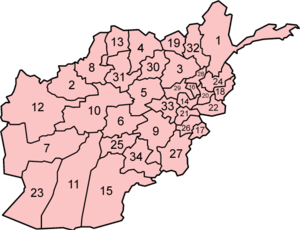
- Image via Wikipedia
Are the Haqqanis next on Pakistan's hit list? | FP Passport.
New York Times journalist David Rohde's account of his kidnapping and subsequent escape from Taliban militants affiliated with the Haqqani network in North Waziristan region of Pakistan makes for riveting reading. It's an amazing story, and one has to admire Rohde's fortitude and survival instincts during his seven-month ordeal.
Read all of it, but I just have one comment about this bit from the epilogue:
My suspicions about the relationship between the Haqqanis and the Pakistani military proved to be true. Some American officials told my colleagues at The Times that Pakistan's military intelligence agency, the Directorate for Inter-Services Intelligence, or ISI, turns a blind eye to the Haqqanis' activities. Others went further and said the ISI provided money, supplies and strategic planning to the Haqqanis and other Taliban groups.
Pakistani officials told my colleagues that the contacts were part of a strategy to maintain influence in Afghanistan to prevent India, Pakistan's archenemy, from gaining a foothold. One Pakistani official called the Taliban "proxy forces to preserve our interests."
Meanwhile, the Haqqanis continue to use North Waziristan to train suicide bombers and bomb makers who kill Afghan and American forces. They also continue to take hostages.
We'll see how long this relationship holds, but if you need any convincing that the ISI at least tacitly allows the Haqqani folks to do their thing unmolested, consider this: To get to South Waziristan, where the Pakistani Army is engaged in a fierce battle with the Pakistani Taliban around the Makin area, which is dominated by the Mehsud tribal grouping, some units had to drive through North Waziristan. In fact, they drove right through the center of Miram Shah, the regional capital and Haqqani stronghold where Rohde made his escape -- and there was just one isolated IED attack along the way.
What does that tell us? At a minimum, it tells us that the powers that be in North Waziristan are being very cooperative and not coming to the Mehsuds' aid. And supposedly, the Haqqanis and their local allies, led by another Pakistani Taliban leader named Hafiz Gul Bahadar, have explicitly pledged not to interfere. The Pakistani military has struck a number of much-criticized peace deals with Bahadar over the last few years, and some say the security establishment in Rawalpindi is all too happy to keep this relationship alive so long as the Haqqanis and Bahadar only launch attacks in Afghanistan, not at home.
American officials have been hinting in recent weeks, however, that the Pakistani military is simply tackling one challenge at a time -- the Mehsuds -- and the Haqqanis may be next on their hit list. That's certainly what AfPak envoy Richard Holbrooke and Amb. Ann Patterson seem to be telling Frontline, though one can detect a little daylight between the two U.S. diplomats. In Holbrooke's words, the Pakistanis "are quite clear in their own minds that Haqqani poses a threat to both Afghanistan and Pakistan." Patterson says, "[W]e're working with them on these, and I think they increasingly see these [other] groups as a threat as well" -- but Pakistan is not willing to turn on them yet.
Meanwhile, the U.S. is still conducting airstrikes in North Waziristan, which is still teeming with foreign militants and where it's widely thought that Osama bin Laden has hidden out at one point or another during the last few years. This is definitely a story to watch.
Related articles by Zemanta
- Where Is Richard Holbrooke? (huffingtonpost.com)
- A Rope and a Prayer (nytimes.com)
- Pakistan fights 'mother of all battles' with the Taliban (telegraph.co.uk)
- NYT: Pakistan balks at wider Afghan war (msnbc.msn.com)
- Billions in aid never reached Pakistan army (msnbc.msn.com)
- 'Huge' Car Bomb Blast Rocks City Checkpoint (news.sky.com)
- Gunmen shoot senior Pakistani army officer (guardian.co.uk)
- Pakistan's ISI still supporting the Taliban say Afghans (telegraph.co.uk)

![Reblog this post [with Zemanta]](http://img.zemanta.com/reblog_e.png?x-id=2a510bfa-22a2-4e2d-acc9-d387bb0d5728)

No comments:
Post a Comment